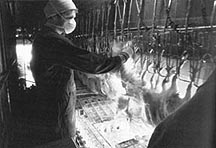|
July 10 , 2000 The
End Is Near Temp
Slave Revolt Locked
Down Editorial Forgotten
America Appall-O-Meter Bully
Culprit Three's
Company Don't
Drink the Water Eight
Is Enough Pass
the Petition Profile Botched
Burbs Harrington's
Way Slaughterhouse
Live Shakespeare
Inc. Post-Feminist
Smackdown! |
By Jeff Sharlet
"I Was Content
and Not Content":
The Story of Linda Lord and the
Closing of Penobscot Poultry
By Cedric N. Chatterley and Alicia
Rouverol with Stephen A. Cole
Southern Illinois University Press
134 pages, $34.95
I've never cut the balls off a bull, but living in a nation that's still a cowboy in its dreams, if not in fact, has given me a fair sense of how it's done. I've even stared down a plateful of bull balls, otherwise known as Rocky Mountain oysters, and I can tell you the experience is not a pleasant one. I'm a city boy. Give me a nice piece of roast chicken any day.
 |
|
Linda
Lord cared nothing for her work, but no work she found could compare.
Credit: Cedric N. Chatterley.
|
Of course, half the fowl of this world have balls too. And before those birds get to your plate belly-up and golden-brown, something has to be done with the family jewels. Apparently, what's done is known as "caponizing" - a fact I learned from a remarkable yet frustrating book called "I Was Content and Not Content": The Story of Linda Lord and the Closing of Penobscot Poultry. Here's Lord on the subject: "Caponizing. That's a male bird, you take the - what I would call the balls - out of a male bird and make them bigger, okay, get a fatter bird."
Got that? I didn't. But the interviewer, an oral historian named Stephen A. Cole, must have, because he didn't ask Lord to explain any further. I know this, because Cole, and his collaborators on the book, Cedric N. Chatterley and Alicia Rouverol, opted to include a full transcript of their conversations with Lord: the "ums," the "ahs," and their own stupidest questions. Theirs is an absolutist approach to oral history.
Oral history, the notion that historical subjects can and should tell their own stories, has been a beloved genre of the left ever since former slaves and white abolitionists crafted true tales of redemption for the moral edification of Northern white audiences. In recent decades, it has become bestseller material in the hands of Studs Terkel, who has crafted compulsively readable narratives out of the lives of ordinary folks.
"I Was Content and Not Content" isn't, to say the least, compulsively readable. As the story of a rural community nearly wiped out by the shutdown of a poultry-processing plant that never provided more than miserable jobs, it's hardly news. Nor is Linda Lord a hero of the resistance; she's a dour, unimaginative conservative who blames her troubles on unions and OSHA regulations. And the book's historical essays are great if the state of our poultry concerns you, but otherwise they're dry meat.
Jeff Sharlet is a feature writer for The Chronicle of Higher Education.
![]()
|
In These Times ©
2000 |
